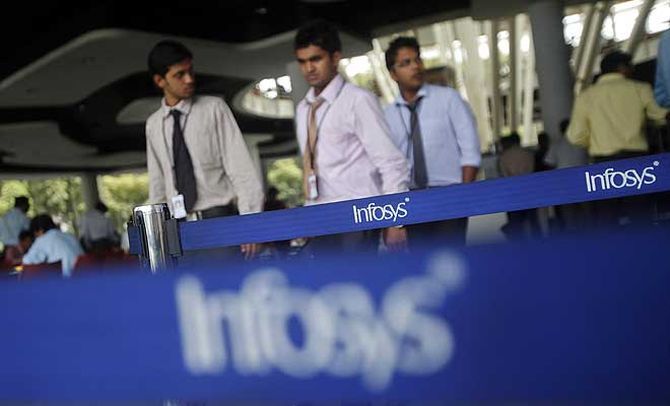India's IT, BPO story isn't over yet, believes Ganesh Natarajan.

Photograph: Reuters.
A busy month of quarterly and annual results have served to underline what we have all known for some time -- the information technology (IT) and business process management services industry is changing at a breathtaking pace.
Customers are driving the digital transformation agenda, and robotics and robotic process automation (RPA), artificial intelligence (AI), machine learning and deep learning are chipping away at all but the most complex human dependent processes.
Finally, protectionist and border closing noises from the West and East (the United States, Europe and Australia) are ringing alarm bells among industry chiefs as well as young folks working or studying for IT jobs even as funds that have vouched for the industry in the past, are wondering how long it would take for the industry and NASSCOM to return to double-digit growth optimism.
The general mood of scepticism is well capsuled in a comment by a reputed research analyst on one of the market leaders of the Indian IT services industry.
To quote his views on the company, "Strategy has lacked cohesion as it dropped the ball on digital, and appears to lack competitive advantages beyond pricing after diluting its historical strength in consulting and business process outsourcing (BPO). Its software business remains too small and acquisitions inconsequential to move the needle in a changing market. We believe a strategy reboot may be essential to maintain market relevance".
While the quarterly and annual results of most firms and, more important, the guidance for the first quarter of the current fiscal are tepid and reflect in some measure the comments made in the paragraph above, the specific clouds and indeed some silver linings vary across the corporate spectrum. The secular weakness indicates three common themes that industry leaders and watchers need to track closely.
The first is the small percentage of revenues derived from products and platforms for most firms compared to the strong thrust made by Accenture in this area.
The second is the inadequate acquisition impact on the top lines and, more important, the bottom lines of firms in the sector.
And the third is the doubt that persists about the readiness of Indian firms to truly partner domestic and global clients in the serious agenda of digital transformation.
The importance of this is highlighted by one firm, which has bucked the trend and reported impressive numbers for the year and great optimism for the future.
WNS reported 13.9 per cent year-on-year growth and 10.2 per cent sequential growth in the fourth quarter and an excellent 15.8 per cent net annual revenue growth on a constant currency basis. Fiscal 2018 growth guidance has been pegged at 19 per cent to 25 per cent, with the company entering the fiscal year with a reported 90 per cent visibility to the midpoint of the range.
With three strategic acquisitions firing well and successful investments in machine learning, social media analytics and a new cloud-based business intelligence platform, here is one company that can challenge the global best in the current year.
In an interesting revelation of the boundaries blurring between IT solutions, Internet of Things services and business process management, WNS Chief Executive Keshav Murugesh, who has also led the NASSCOM BPM Council with distinction in the last two years, credits the success of the company to domain leadership and a focus on outcomes and return on capital for clients.
With solutions that truly embed domain, business processes and analytics and enable digital transformation, WNS shows that with the right strategic thinking and an ability to move beyond tactical ideas like mobile apps RPA and cloud transition, there is life in the old dog yet and the industry is fully capable of rediscovering its mojo and finding a way back to the growth trajectories that made it the darling of stock markets for two decades.
One way of boosting the adrenaline is surely going to be large-scale acquisitions and partnerships with start-ups, which are making waves in our client markets.
A 10-day trip to the US in April and meetings with accelerators, incubators, start-ups and thought leaders like Peter Schwartz of SFDC have convinced us that the future belongs to those who master machine learning, deep learning and inject AI into the nerve system of all processes that affect stakeholders, particularly customers and employees.
A recent article titled The Democratization of Machine Learning by a Wharton professor and a Google product manager talks about the recent acquisition of Kaggle by Google to enable market-based access to data and algorithms and pave the way for an explosion in new applications of AI. The machine learning stack which will enable easy access to all business processes will power new consumer and business tools and will have to be top on the skills list for the massive digital upskilling programmes that every IT firm worth its salt has embarked on in 2017.
Enabling customers and employees to access the data and solutions they need in an AI-enabled manner will be the norm in the future.
Indeed, as a CEO colleague, Tapan Singhel of Bajaj Insurance, mentioned in the US recently, the ultimate destiny of all data scientists on the path of new discovery seems to be to make themselves obsolete and replaced by their own AI creations.
A self-destructing prophecy? That may be fine for roles but it surely cannot happen and will not happen for our technology industry.
The author is founder and chairman of 5F World.











